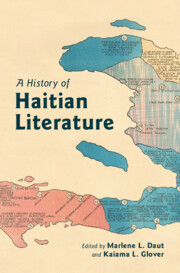Book contents
- A History of Haitian Literature
- Additional material
- A History of Haitian Literature
- Copyright page
- Contents
- Figures
- Contributors
- Chapter 1 Editors’ Introduction
- Chapter 2 Literature as Loot
- Chapter 3 Theater in Early Independent Haiti
- Chapter 4 “So all the world may know it”
- Chapter 5 Civil War, Guerre de Plume, and the Emergence of Early Haitian Periodical Culture
- Chapter 6 History, Politics, and Revolutionary Romanticism in Charles Hérard-Dumesle’s Voyage dans le nord d’Hayti (1824) and the Anonymously Published L’Haïtiade (ca. 1826)
- Chapter 7 The Cénacle and the Sacred
- Chapter 8 Émeric Bergeaud’s Stella
- Chapter 9 The Predicament of Civilization
- Chapter 10 The Politics of Disenchantment
- Chapter 11 Haitian Poetry in Creole
- Chapter 12 Some Causes of the Underdevelopment of Haiti’s Creole-Language Literature
- Chapter 13 Performing Rebellion and Re-membering Haiti’s Past and Present in Twentieth-Century and Contemporary Theater
- Chapter 14 Haitian Writers and the Forging of a National Voice through Periodicals in the Twentieth Century
- Chapter 15 “Arrêtez le monde! Je veux rêver”
- Chapter 16 Occupation-Era Literature in Haiti
- Chapter 17 Haitian Literature and the Dominican Republic
- Chapter 18 Marxism and the Moun Andeyo
- Chapter 19 Jacques Roumain, from Indigenism to Nationalism
- Chapter 20 For a History of the Novel of Haitian Tradition
- Chapter 21 Exile and Twentieth-Century Haitian Writing
- Chapter 22 The Zonbi as Episteme in Haitian Prose Fiction
- Chapter 23 Living Vodou
- Chapter 24 Papa Loko’s Dire Poétique in Twenty-First-Century Port-au-Prince-Based Haitian Poetry
- Chapter 25 Partisan Politics and Twentieth-Century Fictions of the Haitian Revolution
- Chapter 26 Haitian Women’s Fiction
- Chapter 27 Haitian Uses of the Erotic
- Chapter 28 Archiving Narratives of Maternal Loss and Queer Life in Haitian Fiction in the Wake of the 2010 Earthquake
- Index
Chapter 27 - Haitian Uses of the Erotic
Feminist Genealogies and Geographies
Published online by Cambridge University Press: 07 November 2024
- A History of Haitian Literature
- Additional material
- A History of Haitian Literature
- Copyright page
- Contents
- Figures
- Contributors
- Chapter 1 Editors’ Introduction
- Chapter 2 Literature as Loot
- Chapter 3 Theater in Early Independent Haiti
- Chapter 4 “So all the world may know it”
- Chapter 5 Civil War, Guerre de Plume, and the Emergence of Early Haitian Periodical Culture
- Chapter 6 History, Politics, and Revolutionary Romanticism in Charles Hérard-Dumesle’s Voyage dans le nord d’Hayti (1824) and the Anonymously Published L’Haïtiade (ca. 1826)
- Chapter 7 The Cénacle and the Sacred
- Chapter 8 Émeric Bergeaud’s Stella
- Chapter 9 The Predicament of Civilization
- Chapter 10 The Politics of Disenchantment
- Chapter 11 Haitian Poetry in Creole
- Chapter 12 Some Causes of the Underdevelopment of Haiti’s Creole-Language Literature
- Chapter 13 Performing Rebellion and Re-membering Haiti’s Past and Present in Twentieth-Century and Contemporary Theater
- Chapter 14 Haitian Writers and the Forging of a National Voice through Periodicals in the Twentieth Century
- Chapter 15 “Arrêtez le monde! Je veux rêver”
- Chapter 16 Occupation-Era Literature in Haiti
- Chapter 17 Haitian Literature and the Dominican Republic
- Chapter 18 Marxism and the Moun Andeyo
- Chapter 19 Jacques Roumain, from Indigenism to Nationalism
- Chapter 20 For a History of the Novel of Haitian Tradition
- Chapter 21 Exile and Twentieth-Century Haitian Writing
- Chapter 22 The Zonbi as Episteme in Haitian Prose Fiction
- Chapter 23 Living Vodou
- Chapter 24 Papa Loko’s Dire Poétique in Twenty-First-Century Port-au-Prince-Based Haitian Poetry
- Chapter 25 Partisan Politics and Twentieth-Century Fictions of the Haitian Revolution
- Chapter 26 Haitian Women’s Fiction
- Chapter 27 Haitian Uses of the Erotic
- Chapter 28 Archiving Narratives of Maternal Loss and Queer Life in Haitian Fiction in the Wake of the 2010 Earthquake
- Index
Summary
This chapter uses contemporary Haitian fiction by feminist authors to explore the Haitian uses of the erotic. Emmelie Prophète’s Un ailleurs à soi (2018) and Kettly Mars’s Je suis vivant (2015) offer rich examples of how representations of same-sex desire map feminist geographies that foreground the relationship between the body, intimacy, and identity. I begin with a brief discussion of how representations of the erotic have evolved in Haitian literature, then continue with close readings of Prophète and Mars’s women-loving-women protagonists physical and verbal interactions. Guided by Caribbean feminist methodologies, I argue that these authors actively amplify the erotic as a source of freedom that can be powerfully ordinary and quietly mundane which is especially significant in the context of twenty-first-century literature.
- Type
- Chapter
- Information
- A History of Haitian Literature , pp. 477 - 492Publisher: Cambridge University PressPrint publication year: 2024

